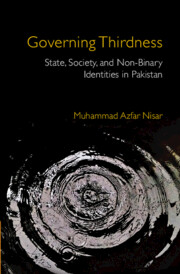Book contents
5 - Governing Thirdness by Law
Published online by Cambridge University Press: 10 December 2021
Summary
What kind of a thing is sex in … bureaucratic exchange? It is curiously at odds with gender … for no performance of gender is convincing enough, no display of femininity sufficient, to stand in for the designation of ‘sex’ that is determined and withheld by the document. Sex is something that the documents themselves enact, and sex becomes performative in the sense that the m or the f on the document does not merely report on the sex of its bearer but becomes the truth of and bestows the bearer's sex. (Salamon 2010, 191)
As noted in Chapter 1, until recently, the khawaja sira were not legally recognized as ‘persons’ by the state as no third gender category was available in the National Identity Card application. All this changed, when a police raid caught some khawaja sira dancing at a marriage ceremony in Rawalpindi, Pakistan, and subsequently allegedly ‘humiliated and manhandled’ them. In response to this incident, which was widely reported at the time, a local jurist, Muhammad Aslam Khaki, petitioned the Supreme Court of Pakistan to ensure that the khawaja sira (the word used in the petition was ‘She-males’) be given their fundamental human rights as envisioned by the Constitution of Pakistan. According to Mr Khaki, the purpose of his petition was to ‘save them [the khawaja sira] from a life of shame’ (Usmani 2009). The petitioner also requested that ‘[t]he government and Civil Society may be directed to come forward, analyze their situation and protect the rights of these innocent oppressed people’. This petition eventually resulted in the creation of the legal third gender category in Pakistan, which was hailed as a historic milestone by local and international activists. Before discussing the response of the khawaja sira to this new legal identity and its impact on their lives in the next chapter, it is important to analyse the construction of the khawaja sira's legal identity by the Supreme Court of Pakistan. The purpose of my analysis is not to pass a normative judgement on the recognition of the khawaja sira rights granted by the Supreme Court of Pakistan.
- Type
- Chapter
- Information
- Governing ThirdnessState, Society, and Non-Binary Identities in Pakistan, pp. 83 - 99Publisher: Cambridge University PressPrint publication year: 2022



